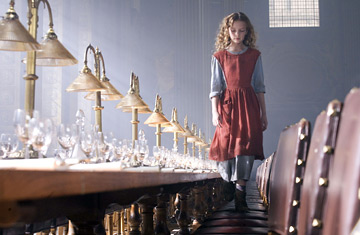
The movie stars newcomer Dakota Blue Richards, 13, as the precocious heroine Lyra.
At 61, Philip Pullman is tall and handsome and pink-faced in that way that older Englishmen often are. His conversation easily ranges from theoretical physics to the work of John Milton. He's like one of those wise, stern-but-humorous uncles usually played in movies by Michael Caine or Jim Broadbent. He doesn't look particularly satanic. But then again, neither, probably, does Satan.
Pullman is the author of His Dark Materials, a trio of fantasy novels that has sold more than 15 million copies since the first volume, The Golden Compass, was published in 1995. It has been turned into a radio drama and a hit London stage play. A movie of The Golden Compass, starring Nicole Kidman and Daniel Craig, opens in the U.S. next week and will probably take its place in the pantheon of profitable fantasy franchises that includes The Lord of the Rings, The Chronicles of Narnia and Harry Potter. But the most striking fact about Pullman's work is that his characters aren't fighting Sauron or the White Queen or Voldemort. Their enemy is the Christian church.
His Dark Materials--the phrase comes from Milton's Paradise Lost--takes place in a glinting, shadowy, clockwork version of Edwardian England, with some (very) notable differences. Every human in Pullman's world has a daemon, a kind of talking spirit-animal that goes wherever he or she goes. "They're able to talk to their daemons, much like talking to yourself," Pullman explains over breakfast at his publisher's offices in New York City. "Like having a conversation with your conscience or your memory." In Pullman's world, the church has evolved into a sinister totalitarian bureaucracy called the Magisterium that perpetrates massive cruelties in the name of good. Later on in the trilogy, readers meet evil angels and, ultimately, God.
We're used to fantasy literature either warily skirting religion (as in J.K. Rowling's work) or subtextually stumping for it (as in C.S. Lewis'). We're not used to fantasy taking on religion foursquare. But to be fair, it's not religion that Pullman has a problem with, exactly, or religious believers; it's what happens when religion mixes with politics. "Religion is at its best when it is furthest from political power," he says. "The power to send armies to war, to rule every aspect of our lives, to tell us what to wear, what to think, what to read--when religion gets hold of that, watch out! Because trouble will ensue." Pullman has even received warm praise from members of the clergy, including the Archbishop of Canterbury, for his exploration of spiritual issues. "I suppose if you are interested in religious questions, that makes you religious," Pullman muses. "I am. What I am not is a believer in the sorts of gods that seem to be on offer from the various major religions."
Pullman sees himself as championing the universal human values of love and tolerance and curiosity, many of which are of course also embraced by Christianity, though not always, he argues, by Christian writers. Lewis' Narnia books arouse in him a level of outrage rarely witnessed during the breakfast hour. "His comments about women throughout are loathsome. His attitude to children who are fat and have freckles--for God's sake!" Pullman says. "I think Lewis was profoundly immoral when he wrote those books."
Atheism has had a best-selling moment of late with the success of books by Richard Dawkins and Christopher Hitchens, and Pullman runs the grave and improbable risk of becoming not just mainstream but fashionable. But he isn't a creature of fashion any more than he's a creature of Satan. "I'm a great admirer of both men," he says, "but I wouldn't want to be part of any movement that had an agenda. I'm not arguing a case. I'm not preaching a sermon. I'm not giving a lecture. I'm telling a story. Any position I take is that of a storyteller who says, Once upon a time, this happened."
